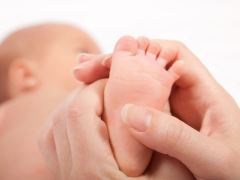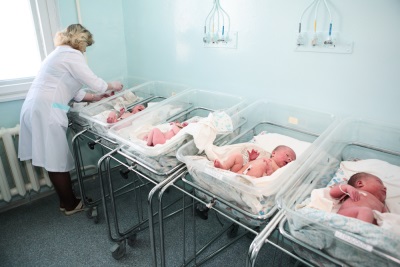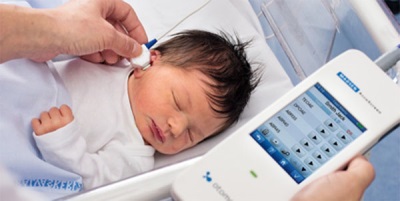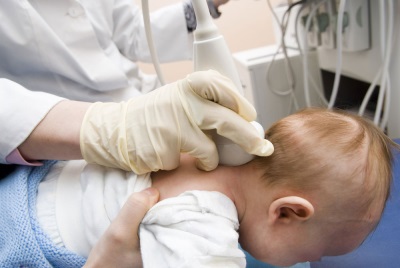Newborn screening
Mass screening of babies after birth to identify serious diseases is called screening.
Why is it needed?
Parents should not abandon this study, because it is able to identify diseases that are important to begin to treat as soon as possible. Thanks to screening, pathologies that cannot be detected in babies during fetal development are detected. However, such diseases can lead to disability or even death, if you miss the time and do not start treatment until the first manifestations.
Just a few tests - and the mother can not worry that the baby will later develop a serious pathology, threatening the health and life of the crumbs. If the disease is diagnosed, the therapy started on time helps to stop the development of the disease and prevent complications.
Kinds
In the first year of life, the baby is waiting for several screenings, and the baby will face the first of them in the maternity hospital.
Neonatal (genetic) for hereditary diseases
The research is aimed at the early detection of hereditary genetic diseases. It is carried out on the fourth day of life in full-term babies and on the seventh day in premature babies. Blood is taken from the toes of the toddler, because his fingers are so small that it does not allow to get enough blood for research. Heel pierced and applied to a special form with circles so that the blood soaked them.
The study is able to determine:
- Congenital hypothyroidism. Pathology is detected in one of 4-5 thousand newborns. The disease affects the thyroid gland, disrupting its function to produce hormones. This threatens to delay the development and growth of the baby. A timely diagnosed disease is treated with hormones, due to which its development stops completely.
- Adrenogenital syndrome. The disease is detected in one baby for 5-20 thousand newborns. With this disease, the work of the adrenal cortex is impaired, so the baby lacks cortisol and aldosterone. With late detection, pathology leads to problems with the kidneys, the function of the cardiovascular system and the formation of the genital organs. If you identify this hereditary disease after birth, the baby has time to prescribe hormonal treatment, preventing complications.
- Galactosemia. Pathology is observed in one in 15-20 thousand children. The disease is caused by a lack of an enzyme that converts galactose into glucose, which leads to damage to the liver, nervous system and other organs of the baby. The main treatment is a diet in which dairy products from the diet of the crumbs are excluded.
- Cystic fibrosis. Pathology is detected in one child for 2-2.5 thousand newborns. With such a hereditary disease affects the respiratory system and the digestive tract. Having identified the disease during screening, they begin to treat it in a timely manner.
- Phenylketonuria. The incidence is 1 in 7,000 children. With this genetic pathology in the body of the infant there is no enzyme responsible for the cleavage of phenylalanine. The result will be the accumulation of this amino acid and its toxic effects on the brain. Treatment of pathology provides a special diet, which is prescribed for a long time.If you identify the disease immediately after birth, you can prevent a delay in mental development.
This is a very important analysis, read more about it in the article about neonatal screening of newborns.
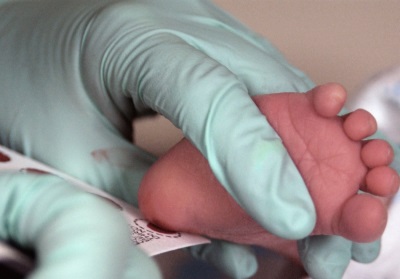
Audiological
This test is aimed at detecting deafness and hearing loss. It uses modern equipment.
Previously, such screening was prescribed only to children at risk, but now it is recommended for all babies, since early detection of hearing problems in many cases allows for the regeneration of hearing. In addition, it is possible to put a prosthesis in the first months of life, which will allow babies with hearing loss to develop at the same level as hearing-impaired children.
Ultrasound - ultrasound
This type of screening is prescribed for the first three months of the baby's life. During the examination can be identified:
- Brain pathologies - both congenital and acquired in utero or during childbirth. If such problems are not detected in time, the baby will experience neurological disorders and brain functions may be impaired.
- Pathology of internal organs. This screening is indicated if a child has problems during fetal development, as well as with growth retardation, indigestion, urination and other adverse symptoms.
- Pathology of the hip joints. If problems are detected in the first weeks of life, treatment will be shorter, and surgery can be avoided.
How many days to wait for the results?
The result of neonatal screening 10 days after blood sampling is sent to the clinic, in which the newborn is observed. If no violations have been identified, the results of the test are simply pasted onto the card; this is usually not reported to parents.
If you received a call or were notified by mail, this means that the indicators were elevated and the child should be re-tested. When confirming the disease, the baby is immediately prescribed treatment.
During ultrasound screening, the conclusion is issued immediately after the examination.
The results of the audiological examination are also ready immediately.
If your child has hearing problems, he will be re-examined after 4-6 weeks in the audiology center.
